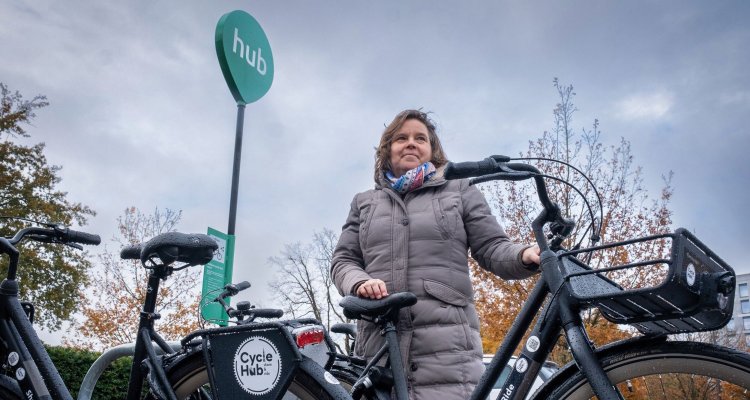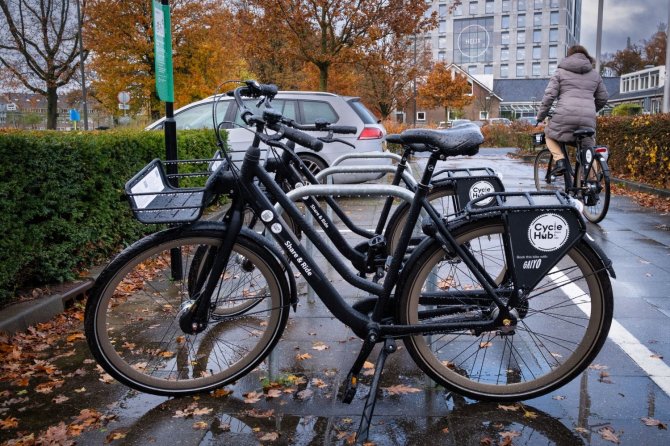
Interview
WUR’s renewed mobility policy rests on intelligently gathered data
One of Wageningen University & Research’s sustainability policy spearheads is mobility. Erna Maters, a sustainability policy official, is working on a mobility vision. “We must speed up the reduction of our emissions.”
Erna Maters enters the Microsoft Teams videocall. She starts with a question: “Is it okay if my son does his homework at the table, outside of camera?” This scene out of the remote work playbook will be all too familiar for many Wageningen University & Research (WUR) employees. On average, we spend 35% of our time working from home. After the COVID pandemic, working remotely has become easier and is facilitated.
Even before the lockdowns, working from home was proposed as a sustainability measure in the 2019 mobility vision. This document states that three-quarters of those commuting by car could work from home on at least one day a week in 2030. “That vision contained concrete goals and measures to further reduce WUR’s CO2 emissions. We aimed to achieve a two per cent reduction per year, to contribute to the climate goals set in the Paris Climate Agreement. It has since become clear that more is needed.” Hence, the implementation agenda containing the practicable measures is being updated. More than ever, based on intelligently gathered data.
Less, different and more sustainable travel
The mobility vision’s framework remains intact: the so-called three Rs. These stand for Reduce, Revise, and Renewable. Maters: “WUR’s mobility policy focuses on reducing the number of travel movements, as we call them. If travel is necessary, we aim to have our employees choose the more sustainable option, such as public transportation or bicycle. Finally, we want to replace polluting options with sustainable ones. One in ten of the shared vehicles on the campus is electric.”

Travel movements include more than just human travel. The distance tractors travel on an experimental field or the transportation of goods is also considered. Maters and her colleagues gather as much information as possible on all travel that concerns WUR. A range of systems, such as commuter travel, declarations of business trips, and the electronic procurement system, provide this data. Additionally, surveys are regularly conducted among employees and students.
“All the data is automatically, if possible, merged into the CO2 dashboard we are developing. That should provide us with a comprehensive view of WUR’s footprint and enable us to advise our colleagues and departments on the impact of their travel.”
CO2 data overview
“We combine various sources of data to calculate the CO2 emissions resulting from commutes”, Maters explains. “We linked the outcome of the mobility survey among employees to the data obtained from travel distance and the number of days employees indicate they work from home.” The results show that an increasing number of employees travel to work by car. Maters believes this matches the national data on the number of double-income households. “This is a national trend, and these households are less likely to move if one of the partners finds a new job. They tend to accept the increased commuting distance.”
The data also reveals the vast impact international business trips have. “As most people know, air travel causes high CO2 emissions.” WUR has a business trip policy. If the trip takes less than six hours, rail travel is mandatory. The vast majority of business travel, however, takes longer. “Not all that surprising. WUR’s domain is international, which means researchers often travel by plane. The question is: when is a business trip necessary?” The travel check, a flow chart to assist employees in choosing sustainable means of transport, was developed for this purpose.
Making the sustainable choice easy
“We want to help employees make weighed decisions”, Maters says. “We can make rules and provide advice, but in most cases, the employees and students, to a lesser extent, will have to make the most sustainable decision.” Maters and her colleagues consulted psychologists to learn how such decisions are made. They stressed how important habits are. “Many decisions are made on autopilot.”
Maters underscores that WUR is lucky with its employees and students. “Here, we value the climate. Discussions show that employees are eager to travel more sustainably but lack options to do so. Hence, WUR tries to make sustainable choices as easy as possible.” To begin with, where Maters and her colleagues have the most influence, for example, the availability of shared EV vehicles and bikes or by reaching agreements with suppliers on sustainable transportation. They will also be able to see how effective these measures are in real-time in their data.